Salisbury attack: Russian TV's claims about poisoning
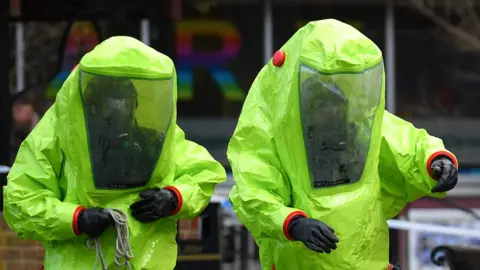 Getty Images
Getty ImagesWhat has Russian TV been saying about the nerve agent attack and how much of it is true?
On 4 March, Sergei and Yulia Skripal were found collapsed on a bench in Salisbury and it was later confirmed by British authorities that the pair had been poisoned by Novichok, a type of nerve agent.
Mr Skripal is a retired Russian military intelligence colonel who came to the UK after being convicted and gaoled in Russia for spying for the UK.
The findings about his poisoning by Novichok have been verified by an independent investigation carried out by the Organisation for the Prohibition of Chemical Weapons (OPCW).
Britain, and many other foreign governments, have blamed the Russian state for the attack.
However the events in Salisbury have been labelled a hoax by some presenters and journalists on Russian TV, and several other rumours about how the incident unfolded have been discussed since it took place.
Despite the fact that British authorities have given updates about the investigation, Russian talk shows complain about an information vacuum.
The Russian government has denied any involvement in the attack.
BBC Russian spent a few days watching episodes from the two talk shows, Let Them Talk on Russia's First Channel and 60 Minutes on Russia 1, and decided to answer some of their guests' frequently asked questions.

Claim: The nerve agent attack was a hoax.
Verdict: The nerve agent in Salisbury has been verified by the OPCW.
TV presenters, including Russia Today journalist Alexander Gurnov, claimed that the entire incident in Salisbury was a hoax.
Mr Gurnov asked: "[Was] there really an assassination attempt? Are they really in a London hospital? Are they really close to death?"
The BBC has reported on eyewitnesses who saw the Skripals and paramedics who were called to the scene.
There were also statements released by the New Scotland Yard police headquarters, and the hospital that treated the pair, that described what happened to them.
The OPCW has said it confirmed "the findings of the United Kingdom relating to the identity of the toxic chemical that was used in Salisbury and severely injured three people".
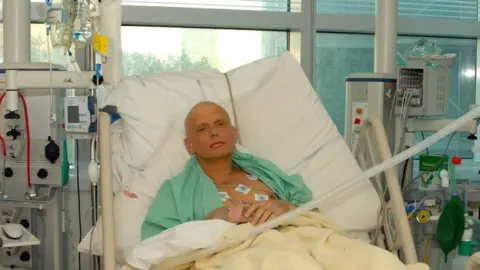 Getty Images
Getty ImagesIt was noted on Russian TV that there are no photos of the victims in hospital.
And this is despite the fact that back in 2006 Alexander Litvinenko, who was also poisoned, was photographed ill in bed after being poisoned.
NHS England issued a statement that said Yulia Skripal has asked for privacy from the media.
Mr Litvinenko, a former officer in the Russian FSB (the main Russian security service) was poisoned in London with radioactive polonium in 2006 and photographed in hospital.
The circumstances surrounding the publication of the photograph are well known, and were written about in the results of the public enquiry into the Litvinenko affair.
The photograph was taken at University Hospital in London, and two days before his death.
He had, by that point, already lost his hair and it was clear that he would not survive; on the same day he dictated a statement to be published after his death.
The idea of taking this photograph came from a friend of Mr Litvinenko's, Alexander Goldfarb.
Mr Litvinenko supported the idea, wanting to tell journalists about his poisoning.
His wife and lawyer were also aware that the press was to receive the photograph from his hospital bed.
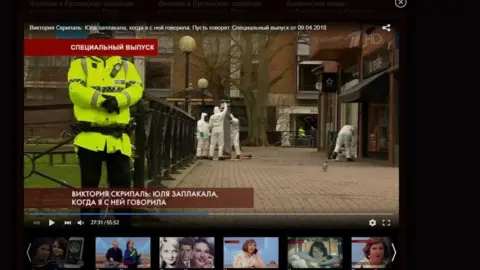

Claim: It is absurd that the police were standing a few yards from the bench without any kind of protective clothing.
Verdict: Only specialist investigators were required to wear protective clothing.
Anton Tsvetkov said on Let Them Talk that it was "clearly just absurd" that police were standing a few yards away from the scene without protective clothing.
It is true that the police stood by the cordon around the bench, pub, and restaurant were not wearing hazmat suits, or gas masks.
However in the images shown while Mr Tsvetkov was speaking they were standing at a relatively long distance away from the potentially harmful areas.
Nerve agents can poison though inhalation, ingestion or skin contact which is why investigators in Salisbury are wearing full protective clothing and gas masks, wrote Alistair Hay, professor emeritus of environmental toxicology at the University of Leeds.
(Health officials have said that Salisbury residents are safe despite traces of the poison that could still be present in the city.)
The BBC asked Vil Mirzayanov, the man who revealed the existence of Novichok, if the policemen waiting behind the cordon would be in any danger.
Mr Mirzayanov, on 18 April, said: "If A234 agent was used [against the Skripals], the policemen are not in danger. If it was applied to a door handle, nothing bad could happen to those who are standing behind the cordon. [If it is] 5 metres or 10 metres, nothing could happen.
"They [the British and OPCW] said it was A234. A234 agent comes in a form of a pasty liquid; the concentration of its vapour is too low to affect anyone.
"But it is another matter if it gets inside through skin or though digestion," he added.
Mr Tsvetkov also said there was a feeling "that the police only cordon off the street for the cameras".
We know from eyewitness testimony, including from BBC journalists at the scene and government statements, that there were a number of areas cordoned off by the police.
Nine sites have been identified by Department for Environment, Food, and Rural affairs (Defra) as needing specialist cleaning.

Claim: Yulia Skripal has refused to talk to Russian journalists and the BBC reported that she was planning to give a press conference. She will blame Russia for the poisoning.
Verdict: We do not know who she intends to "blame". The BBC has not reported that she was going to give a press conference.
Olga Skabeeva on the TV show 60 Minutes said the BBC had reported on 10 April that Yulia Skripal was planning to give a press conference.
Ms Skabeeva said she (Yulia) is "unlikely to blame London for anything".
The same journalist also noted that: "Doctors have announced that Yulia Skripal doesn't want to meet with Russian journalists, nor Russian representatives.
"We really hope that she is being pressured, tortured and harassed [into giving these statements] but the press conference is about to start and as soon as it starts everything will fall into place," Ms Skabeeva added.
The claim about the upcoming press conference was repeated by journalist Evgenii Popov on the show 60 Minutes on 11 April.
However the BBC had not reported that Ms Skripal was ever planning to give a press conference.
According to a statement released by the Metropolitan Police on 11 April, Ms Skripal declined to speak with all journalists - Russian and Western.
Ms Skripal said: "For the moment I do not wish to speak to the press or the media".
In the statement she also noted the fact that the Russian Embassy had been in touch, saying: "I have been made aware of my specific contacts at the Russian Embassy who have kindly offered me their assistance in any way they can.
"At the moment I do not wish to avail myself of their services, but, if I change my mind I know how to contact them," she added.
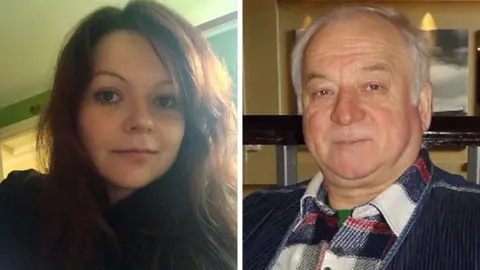

Claim: The Skripals' pets were destroyed in an attempt to conceal evidence.
Verdict: According to a Defra statement the two guinea pigs died of dehydration and the cat, which was found in a distressed state, was put down "in the best interests of the animal" by the vet.
Nikolai Dolgopolov, the deputy editor in chief of Russian Gazette, on Let Them Talk said the disappearance of "innocent rabbits, guinea pigs, and kittens" was part of a concerted effort to destroy evidence.
Viktoria Skripal, Yulia's cousin, mentioned it was only after her intervention that British authorities explained the fate of the cat.
It is true that the British authorities announced the fate of the cat and the guinea pigs only after the Russian embassy contacted the Foreign Office.
Defra announced that when a veterinarian came to Mr Skripal's home, the guinea pigs had already died of dehydration, and the cat was in a poor condition.
A statement read: "A decision was taken by a veterinary surgeon to euthanise the animal to alleviate its suffering".
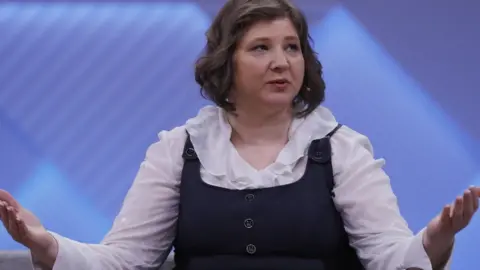 Reuters
Reuters
Claim: The British will demolish the pub, restaurant, and Mr Skripal's house. It is obvious this is an effort to destroy the evidence.
Verdict: There is no official commitment to destroying any of these buildings. Defra has recently announced that it will take months for the sites to reopen.
TV host Evgenii Popov said Russia will be labelled as guilty and it would not be possible to prove otherwise because Mr Skripal's house won't exist anymore.
Others on Russian TV have referred to a Daily Mail article that said the house and other buildings in Salisbury will be destroyed.
The article claimed that sources suggested Mr Skripal's £400,000 house in Salisbury "may be demolished to completely expunge traces of the Russian-made Novichok nerve agent".
However official sources have not publicly announced anything specific about the fate of the buildings.
BBC Russian was unable to confirm these reports with the police or Defra.
These official organisations clarified that currently Mr Skripal's house and other premises are still scenes of investigation; afterwards, when the police finish their investigation, specialists will begin the work of making the buildings safe.
A recent Defra statement did not mention whether the house would be destroyed.
Rather, it said that as part of the investigation "meticulous work is required and we expect it will be a number of months before all sites are fully reopened."
Russian talk shows frequently discuss claims that the British authorities intend to destroy evidence.
However in reality British official sources frequently state that police are actively collecting and preserving all traces of evidence.
For example, it has been reported that the investigation has collected over 1350 pieces of evidence, recorded over 5000 hours of camera footage, identified 500 witnesses and already questioned a few hundred people.
The police have also reported that the bench on which the Skripals were found has been removed from the park specifically to preserve it as a possible source of evidence for the investigation.



